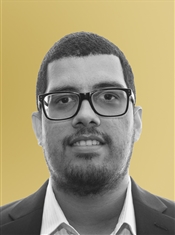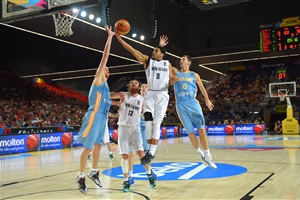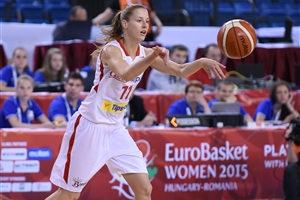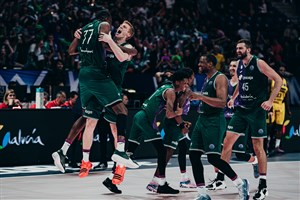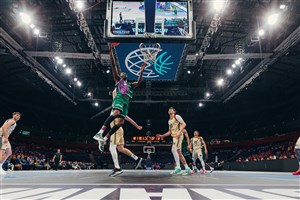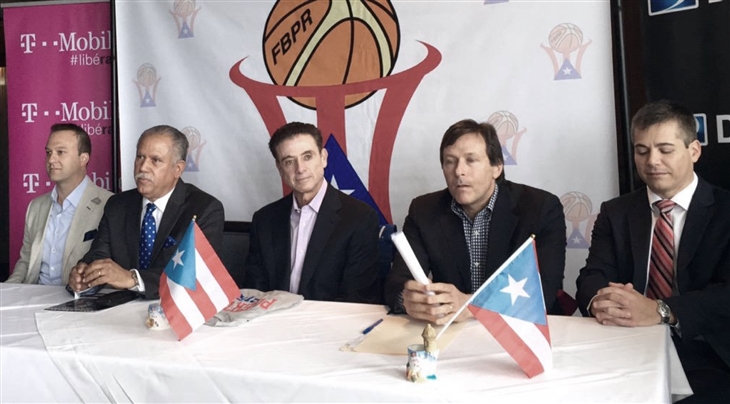
This moment where one is old and the other one is not getting paid
SAN JUAN (William Rosario's Somewhere in the Americas) - It has been quite a month for the Puerto Rican national team. As soon as the plan for the summer was announced, with the first step being a visit by new head coach Rick Pitino to individually evaluate players, expectation grew as to what would happen when the college basketball legend arrived in the island.
And then it happened, and it was even better than I thought it would be. Pitino brought with him that wonderful confidence that has made him one of the most important names in coaching for the last 25-plus years. It made for a great couple of days in the only country in the Americas where basketball is the number one sport, with a little bit of everything for everybody.
It started with a press conference that Pitino opened with the reveal of a t-shirt he had prepared that had three words: "Puerto Rico First" and a quick but loud "Bravo!" was heard from the crowd gathered at the Ruth Chris Steakhouse. The new regime was off and running.
Comprometido Pitino con Puerto Rico | http://t.co/bVYHUUB67W #EquipoPUR pic.twitter.com/THKuMMVx8S
— Comité Olímpico PUR (@ComiteOlimpico) June 4, 2015
Then came the big one. He explained the concept behind the t-shirt and proceeded to underline the fact that there were only three players with guaranteed spots in the national team: Jose Juan Barea, Renaldo Balkman and Maurice Harkless.
Wait, who? There seemed to be one name missing in that trio. Mmm, that guy, the point guard that had been the face (or co-face) of the team for the last 14 years. The one that played nine seasons in the NBA, four in the Euroleague, the only one with Olympic experience…what's his name?
Arroyo! Where is he? What happened?
Well, at first, Pitino made the following statement: "I don't believe Carlos is going to fit into the plans, because I'm not sure he wants to play [with the team] and I'm not sure that for a 36-year-old it is in his best interests to play. He will want to play a year or two more in Europe and this type of time, and dedication and practice…we are going to probably want to with young guys in the backcourt. No more than 31 or 32 years of age."
Wow. Oh, and he added to it by inviting Arroyo for a tryout two days later.
Puerto Rican Internet broke.
Some people defended Arroyo's career contributions to the national team, some understood Pitino's comments while gracefully saying goodbye to the point guard, others threw ageism accusations at the coach, and then others, who were tired of Arroyo and wanted him long gone, celebrated Pitino's gunslinger approach. I actually saw a popular TV show where everybody seemed to take one of those positions on the issue.
Al parecer, para el dirigente Rick Pitino, Carlos Arroyo es muy viejo por tener 36 años http://t.co/6XYIXubJqS pic.twitter.com/YRX2f3ZjyJ
— Primera Hora (@primerahora) June 4, 2015
The next day Arroyo was confronted on it and told media he felt disrespected.
Carlos Arroyo lamenta expresiones de Pitino http://t.co/RbT52vTjH7 pic.twitter.com/ANZON2aegR
— Primera Hora (@primerahora) June 5, 2015
Pitino proceeded to sort of backtrack on the comments, while going ahead with his scheduled individual workouts. There were 30 players evaluated in four days and poof, the coach left the island after announcing that Larry Ayuso (the 38-year old shooting guard) was the best player he saw all week. Puerto Rico, and its basketball fans were left in kind of a punch-drunk, "what just happened?" state.
I loved it.
But I love to witness this kind of spectacle when it comes to sports. I love the child-like behavior of social media when it comes to LeBron James; I loved the reaction around France's upset of Spain at last year's FIBA Basketball World Cup; I love the Valdeolmillos/Ayon/Mexican-sports-directors current "telenovela"; I love whatever is going on with the Lakers and Knicks right now; and I love this crazy changing tide that Puerto Rican basketball is going through at the moment. It's the end of an era, or the transition to the end of an era.
But…there's one thing I don't love. And I'll preface this by cautioning that there's going to be a lot of "I don't knows" in the following argument.
Let me first say that I studied communications, so I pay special attention to semantics, to the way that people choose to establish a mission statement through their presentation, what they say and how they say it.
And there's a phrase that Pitino repeated over and over when he visited the island: "I'm not getting paid for this. I'm not making any money, I'm just doing this for the challenge."
In every interview he mentioned the fact that he's not getting paid. At first, I thought "mmm, of course, he's a millionaire coach, why would he?", but it became so incessant that it started to jump at me and eventually made me rethink my initial dismissal.
(Here come the "I don't knows", I warned you.)
And I don't know how to ultimately feel about it.
I don't know how to feel about it being flaunted in a country that has a 12.2 percent unemployment rate and has sports, and basketball, as a big expertise area, where coaching is a profession openly disrespected every year (where an experienc coach like Flor Melendez is fired with a winning record in the first year of his contract and in the same day of a game, or where experienced coaches like Omar Gonzalez and Carlos Calcano are fired only to be replaced by their owners).
I don't know what kind of a precedent this creates for national federations going after high-profile coaches that don't need the dough. I don't know how this sounds to coaches like Sergio Hernandez, Ruben Magnano, David Rosario and Sergio Valdeolmillos, who actually need the national team payday, and how this threatens their livelihood possibilities for the future. (Does this affect their future power in contracts negotiation?)
I don't know what happens when a coaching arrival lands in a country dressing itself in the "I'm doing a favor to you" context. How does the national federation feel about that moving forward? The players? The fans? The media? (One local reporter actually sat down with Pitino for a one-on-one and started the interview by welcoming the coach to the island and then adding a "thank you for accepting the head coaching position of the national team"). In what kind of position does this put everybody when thinking about the national team this coming summer. Is this going to remain a country of three million-plus coaches where every move is carefully scrutinized (eventually criticized)? Or has everybody now become an assistant coach and will be happy no matter what? Are the dynamics of basketball going to change in the island with this arrival and contextualization? Is the value of the international opportunity this represents for Pitino being lost here?
I don't know, but we've been here before. Kentucky University's John Calipari was the head coach of the Dominican Republic for two years; I was actually present at more than 90 percent of his press conferences, followed his comments in the media very closely and never heard of him talking about money. I still don't know what he made (if he made) with the team. And he's a millionaire too.
I respect Rick Pitino's career and I think he was the right (not to say perfect) choice for the Puerto Rican national team at this moment, but this, along with the management of the Carlos Arroyo situation, does not exactly constitute a great start.
But, national team basketball hasn't been played yet, winning fixes everything and Pitino is a proven winner with an overall 722-254 (74.0 percent) coaching career record. That speaks for itself. Literally a Hall of Famer, literally nothing else needs to be said.
…
…
…
P.S. One quick side note: How amazing is it that in such a short period of time the pendulum has swung so far? Two years ago, Paco Olmos was lauded as the new savior, the man that was going to instill an European basketball system to the national team in order to fix it all. Now, the country has not only dismissed the European basketball concept, along with the Spaniard, but it quickly has embraced the "Puerto Rico First" tag (not "Puerto Rico Primero", by the way, in a Spanish speaking country), along with the New Yorker that came up with it.
Just a thought. In the end, like I said before, I love this spectacle.
So it's fine by me. Apart from the curiosity of its development, I'm here enjoying it all, trying to quietly eat my popcorn.
Hey, before you go, look at this Carlos Arroyo Instagram pic!
William Rosario
FIBA
FIBA's columnists write on a wide range of topics relating to basketball that are of interest to them. The opinions they express are their own and in no way reflect those of FIBA.
FIBA takes no responsibility and gives no guarantees, warranties or representations, implied or otherwise, for the content or accuracy of the content and opinion expressed in the above article.
